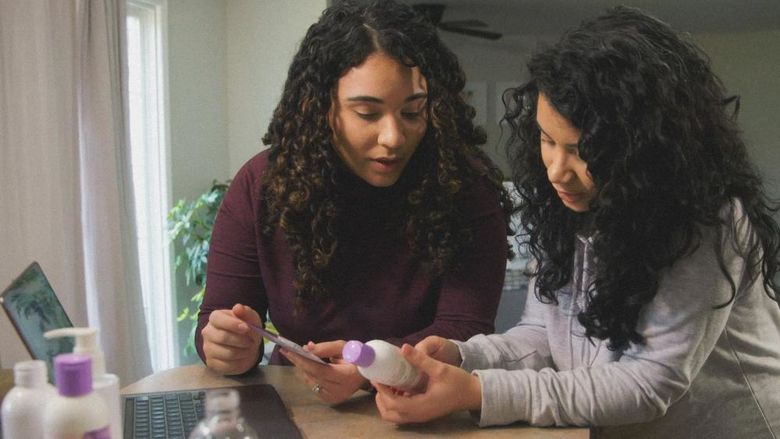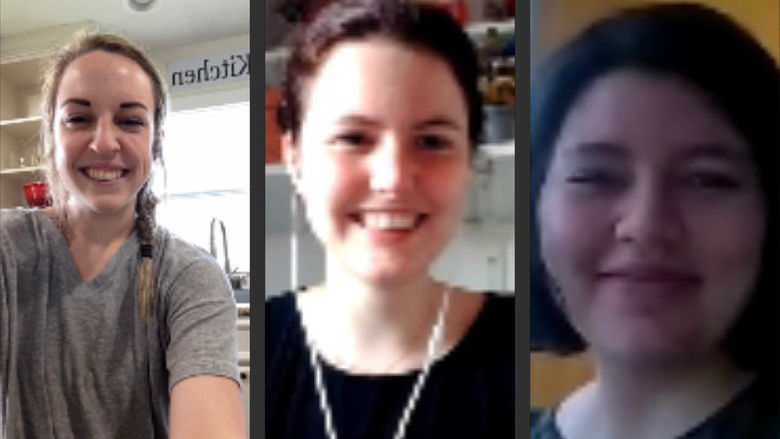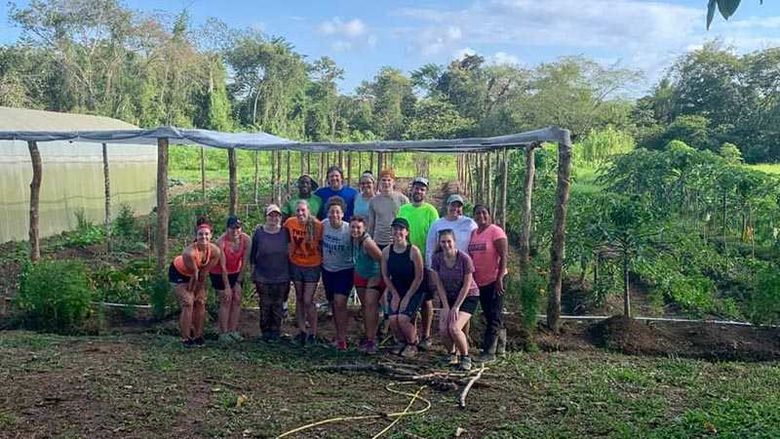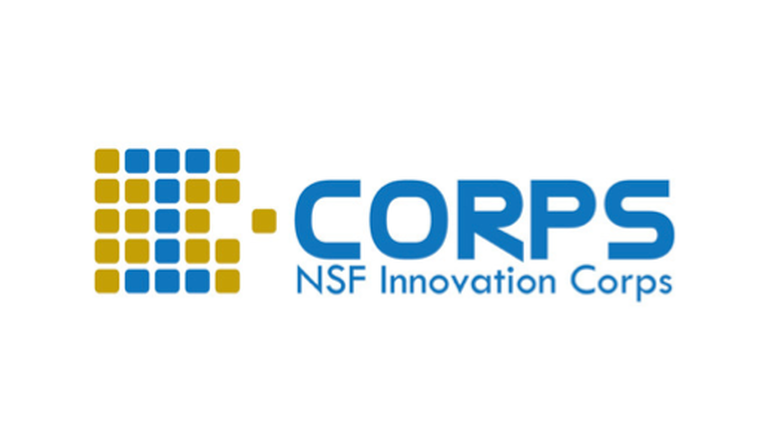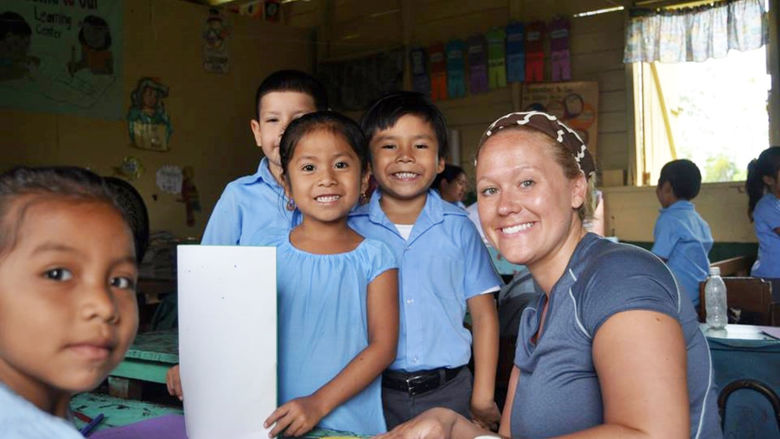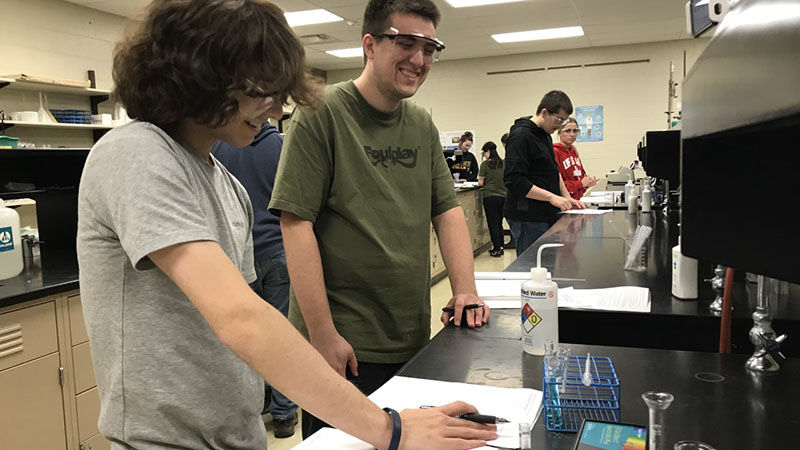
Experimental Chemistry I students at Penn State Shenango learn to use new Bluetooth spectrometers in the chemistry lab. This new equipment will be used in the chemistry EDGE project.
SHARON, Pa.— While most faculty spend their summer completing research, teaching summer classes, or preparing for the fall semester, Penn State Shenango Assistant Teaching Professor of Nursing Maureen Dunn spent part of her summer abroad, networking with faculty from Lille Catholic University in France and at The Hague University of Applied Sciences in the Netherlands.
Dunn’s trip was in collaboration with Penn State’s Experiential Digital Global Engagement (EDGE) program, which enables Penn State Shenango classes to connect with students around the world using technology, as well as helping them to develop 21st-century workforce skills.
“As nurses, we care for a culturally diverse population,” said Dunn. “I feel that by incorporating global learning into the curriculum, the students can provide care that is patient-centered and sensitive to a person’s culture.”
Dunn is not the first Shenango faculty member to get involved with the EDGE program. Katherine Shaffer, assistant teaching professor of chemistry, became interested in EDGE in May 2017 after hearing about the Beaver campus’ collaboration with the program from Chancellor Jenifer Cushman. Shaffer now serves as secretary for the University’s program and has been working in collaboration with a faculty member from the University of Split in Croatia to provide a virtual international learning experience to students in both countries.
“As soon as I heard Dr. Cushman discuss the EDGE program, I knew that I wanted to learn more and be involved,” said Shaffer.
EDGE uses technology to create a “virtual international exchange,” by utilizing Collaborative Online International Learning (COIL), which was developed by The State University of New York to refine the concept of globally networked learning.
“Bringing an opportunity for international collaboration to my first-year chemistry students has always been one of my goals,” said Shaffer. “Working with faculty across the ocean to enable my students to experience this type of technology will definitely check off a few boxes on my ‘academic’ bucket list of things I’ve wanted to accomplish in my career.”
Since fall 2018, when Shaffer traveled to the University of Split, she has been working with Igor Jerkovic to establish a collaboration between her students and those in Croatia. Late last fall, Jerkovic, as well as University of Split professor Drazan Jozic, who is currently working on a research project with Michael Hay at the Penn State Beaver campus, returned the visit, traveling to the Shenango campus and presenting on Croatia, the City of Split, and the University. As part of their visit to western Pennsylvania, Jerkovic and Jozic also spent time at the Beaver campus and in the greater Pittsburgh area.
Currently, Shaffer and Jerkovic are working on an EDGE collaboration that will involve students enrolled in this fall’s chemistry courses from both universities. But Shaffer, who also is the Shenango campus’ EDGE coordinator, is taking the collaboration one step further. In order to offer her first-year chemistry students support as they interact with students in Croatia, she is working with Lecturer in Communications Tiffany Petricini to allow those who are also taking Petricini’s speech class to focus on international communication skills.
"When Dr. Shaffer asked me to collaborate, I was excited to have the opportunity to be involved in such a great program to enrich our students' experiences,” said Petricini.
The Project
When the two classes come together later this fall, Jerkovic’s and Shaffer’s students will be collaborating on a new probe analysis of wine for its alcohol content. Since both areas, Croatia and western Pennsylvania, have a history of wine making, the professors felt that it would be a motivating subject for the students to work on, and both Jerkovic and Shaffer are excited to get started.
Dunn, who has a few projects of her own in mind for her nursing students, was equally impressed and enthusiastic after also hearing Beaver’s Cushman speak about the program. Like Shaffer, she is interested in using the EDGE program for cross-discipline teaching and interprofessional collaboration. For the past three years, she has been working with Roxanne Atterholt, assistant teaching professor of human development and family studies (HDFS), to integrate both nursing and HDFS students on projects to demonstrate the importance of working collaboratively for their patient’s best interest.
“This module could be enhanced by incorporating not only other professions but different cultures,” said Dunn. “The World Health Organization recognizes interprofessional collaboration in education and practice as an innovative strategy that will play an important role in mitigating the global health workforce crisis.”
Dunn is looking forward to moving quickly, and by fall 2020, hopes to be collaborating with Lille Catholic University in France or The Hague University of Applied Sciences. Like Shaffer, she is equally excited to bring this educational experience to her classroom through various forms of digital engagement, such as the online conference site Zoom.
Both Shenango professors understand that there may be some challenges, including coordinating class schedules, and some language barriers, but that doesn’t concern the two or cause them to shy away from this new, innovative teaching opportunity for their students. They continue to learn about best practices from colleagues around the world. They recently traveled to the International Virtual Exchange Conference at the University of Washington Tacoma and look forward to incorporating what they learned into their EDGE courses.
